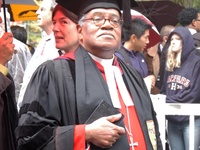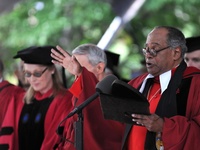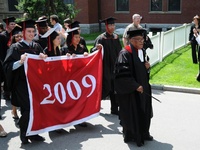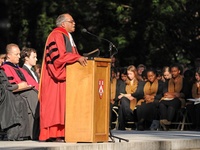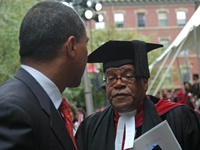“It was a very powerful moment,” Austin said.
According to Harvard Divinity School Professor Emeritus Harvey G. Cox Jr., Gomes never felt alienated at Harvard after revealing his orientation, as calls for his resignation were widely ignored.
According to Cox, Gomes once told him that when he “came out as gay there were fewer raised eyebrows and comments than when people found out I was a Republican.”
Gomes was a long-time Republican in a University known for its liberal faculty and delivered prayers at the inaugurations of Presidents Ronald Reagan and George H.W. Bush.
But in recent years, Gomes’ political views began to shift to the left.
In 2006, he registered as a Democrat in order support of the gubernatorial candidacy of Deval L. Patrick ’78. Gomes delivered a prayer at Patrick’s inauguration.
“Peter Gomes was a unique individual and beloved friend,” Patrick said in a statement sent to The Crimson. “He taught so many that faith is not just what you say you believe, but how you live. His loss is profound for so many, including [my wife] and me.”
A LEADING VOICE
But Gomes will perhaps be best remembered for his sermons in Memorial Church, where he would address the audience in a booming, sonorous voice and deploy a style that seemed largely pulled from another era, harkening back to the great tradition of Baptist oratory.
With that voice—and a profound message of religious toleration—he tended to fill the pews.
“While attendance at some college churches has dwindled, it has not at all at Memorial Church,” Cox said. “Part of the reason for this is the eloquence of Peter’s preaching and his welcoming attitude.”
During his time as Harvard’s spiritual lodestar, Gomes became a leading voice for pluralistic religious ethics and was well known for saying that one could interpret the Bible in a variety of ways, noting that Biblical passages had been used to support both slavery and liberation.
“The Bible alone is the most dangerous thing I can think of,” he once said in an interview with The Los Angeles Times.
“You need an ongoing context and a community of interpretation to keep the Bible current and to keep yourself honest. Forget the thought that the Bible is an absolute pronouncement.”
“I think he is the greatest of the clergy men that Harvard has had,” longtime friend and Divinity School Professor Emeritus Preston N. Williams said.
Read more in News
Number of Seniors In Gen Ed Doubles








